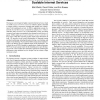Free Online Productivity Tools
i2Speak
i2Symbol
i2OCR
iTex2Img
iWeb2Print
iWeb2Shot
i2Type
iPdf2Split
iPdf2Merge
i2Bopomofo
i2Arabic
i2Style
i2Image
i2PDF
iLatex2Rtf
Sci2ools
110
click to vote
SOSP
2001
ACM
2001
ACM
SEDA: An Architecture for Well-Conditioned, Scalable Internet Services
We propose a new design for highly concurrent Internet services, which we call the staged event-driven architecture (SEDA). SEDA is intended to support massive concurrency demands and simplify the construction of well-conditioned services. In SEDA, applications consist of a network of event-driven stages connected by explicit queues. This architecture allows services to be well-conditioned to load, preventing resources from being overcommitted when demand exceeds service capacity. SEDA makes use of a set of dynamic resource controllers to keep stages within their operating regime despite large fluctuations in load. We describe several control mechanisms for automatic tuning and load conditioning, including thread pool sizing, event batching, and adaptive load shedding. We present the SEDA design and an implementation of an Internet services platform based on this architecture. We evaluate the use of SEDA through two applications: a high-performance HTTP server and a packet router for...
Related Content
| Added | 17 Mar 2010 |
| Updated | 17 Mar 2010 |
| Type | Conference |
| Year | 2001 |
| Where | SOSP |
| Authors | Matt Welsh, David E. Culler, Eric A. Brewer |
Comments (0)

